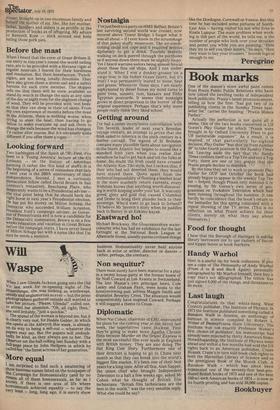Book marks
One of the season's more awful puns comes from Praxis Public Public Relations who have now joined the swelling ranks of independent book publicists. Praxis's latest pronouncement, telling us how the firm "has got two of its publishing clients in the Sunday Times bestseller list" carries the heading: "Praxis Makes Perfect".
Actually the perfection is not quite all it seems. One of the two books concerned is Ulf Goran's Play Guitar for which "Praxis were brought in by Oxford University Press to get Ulf nationwide exposure". As a result, it is implied, of that particularly far-sighted decision, Play Guitar "has shot up from number 39" to take fourth position in the Sunday Times list. Leaving aside the fact that tht2. Sundy Times confines itself to a Top Ten and not a Top Forty, there are one or two points that the Praxis people decline to mentioh.
By the time they set to work to promote Play Guitar for OUP last October the book had already begun to appear in the' weekly Top Ten list — helped, though Praxis only mention it in passing, by Mr Goran's own series of programmes on Yorkshire Television which had been running throughout the summer. It can hardly be coincidence that the book's return to the bestseller list this spring coincided with a repeat showing of the TV series. (This is no reflection on what Praxis achieve for their clients, merely on what they say about themselves.)
Food for thought
I hear that the Borough of Haringey is asking library borrowers not to use rashers of bacon and kipper bones as book markers.
Handy Warhol
Here is a useful tip for book collectors. If you see a copy of The Philosophy of Andy Warhol (From A to B and Bach Again), personally autographed by Mr Warhol himself, then buy a copy that's not autographed. The fellow has just signed 6,000 of the things, and threatens to
do more. '
Last laugh
Congratulations to that whizz-bang West Country publisher, The Institute of Physics. In 1973 the Institute published something called A Random Walk in Science, an anthology of humour in science compiled by Robert L. Weber of PerMsylvania State University. The Institute was not exactly Professor Weber's first choice of publisher: his manuscript had already been rejected by thirty American firms. Notwithstanding, the Institute of Physics went ahead and within a few months had sold the US rights back to an American publisher, Crane Russak. Crane's in turn sold book club rights to both the Macmillan Library of Science and to the prestigious Book of the Month Club. A Random Walk which has since been nominated one of the seventy-five best-produced British books of 1973 and one of the best 100-sci4ech American books of 1974 — is now in its fourth printing and has sold 30,000 copies.
Bookbuyer


































 Previous page
Previous page